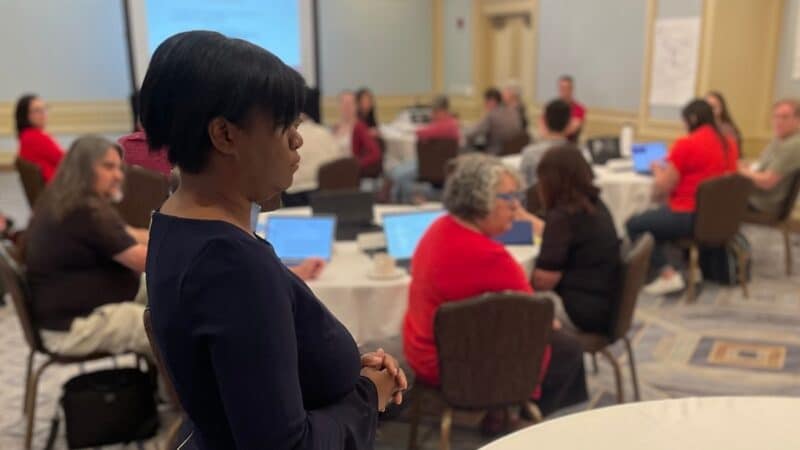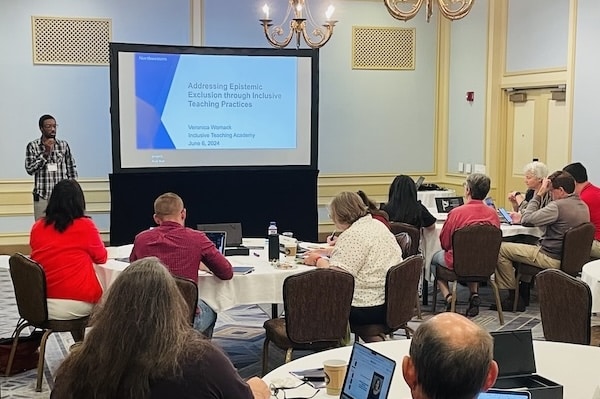“Rich and Textured”: Kaneb Center Hosts 2024 Notre Dame Inclusive Teaching Academy

Held June 4–7 at the Palmer House Hotel in Chicago, the 2024 Notre Dame Inclusive Teaching Academy (NDITA) was not simply an academic conference focused on fostering classroom environments where all students can flourish.
The event itself was an exercise in building a community of belonging, its program productive yet friendly, inspiring while being rooted in actionable ideas.
Hosted by Notre Dame Learning’s Kaneb Center for Teaching Excellence, NDITA is small by design—this year’s cohort of 25 participants represented 12 colleges and universities—to encourage ongoing discussion and collaboration among the attendees. Featuring invited keynotes, presentations by members of the Kaneb Center team, and small-group working sessions, the event aims for a 50-50 split between faculty from Notre Dame and elsewhere and covers the cost of registration, lodging, and breakfast and lunch for all of them.

“Our goal is to create space for faculty to reflect on their teaching, have conversations with others about teaching, and add strategies to their pedagogy toolkit in order to become more intentional and transparent in their approach to teaching and learning,” Horane Diatta-Holgate said. The program director of inclusive pedagogy at the Kaneb Center, he organized the event along with the Kaneb Center’s Amanda Leary and Nara Schmitt. “We want to help faculty apply high-impact teaching practices to promote the success of all students in the classroom and beyond.”
Flower Darby, author and associate director of the Teaching for Learning Center at the University of Missouri, delivered the first keynote on “Everyday Teaching with AI to Advance Equity and Inclusion.”
“We don’t know what our students are bringing into our classes,” she reminded the attendees Wednesday morning, calling on them to pay attention to taking care of the whole person in their courses—themselves as instructors included.
Darby paired that with how instructors might use AI to increase both students’ sense of belonging and their general facility working with AI tools, acknowledging as she did the inherent challenges the technology poses to academic integrity, among other ethical concerns. Given that, she emphasized the importance of motivating students to want to learn and shared suggestions for how to do that better.
On Thursday morning, Veronica Womack, associate director of inclusive teaching at the Searle Center for Advancing Learning and Teaching at Northwestern University, delivered the week’s second keynote on “Addressing Epistemic Exclusion Through Inclusive Teaching Practices.”
A social psychologist, Womack began her session by asking the group to reflect on what type of scholarship is deemed legitimate in their fields as well as the experiences and observations that informed their responses.
She used this as a bridge to share epistemic exclusion theory, explaining that epistemic exclusion occurs when individuals or institutions devalue scholarship outside of the dominant discipline and claim that marginalized scholars fail to make contributions to knowledge production.
Connecting this back to teaching, Womack then asked the group to consider what role epistemic exclusion plays in the classroom. She identified teaching strategies that promote its inverse, epistemic inclusion, and encouraged the attendees to examine the assumptions that may inform the design of their course assignments and assessments.
Fay Stevens, an archaeologist based at Notre Dame’s London location, was struck by “the incredibly rich and textured and nuanced ways of thinking about inclusivity” shared by Womack and others.
“Not necessarily trying to pin a definition of it down,” Stevens said, “but actually opening up the conversation about … the many possibilities it offers for us as teachers—and also for me, as academics, as well. I’m thinking as a teacher, but I’m thinking in my field as an academic at the same time. They’re not separate, they’re part of the same kind of holistic roundness in relationship to that.”
Like Womack’s and Darby’s keynotes, the series of presentations led by members of the Kaneb Center team throughout the four-day event were structured to be interactive.
With Diatta-Holgate, Leary, Kristi Rudenga, Jim Lang, and Kathy Quardokus Fisher serving as facilitators, these sessions offered deep dives into topics such as inclusive strategies for formative assessments, how to integrate diverse perspectives into one’s teaching, and incorporating transparency in major assignments.
“What I appreciate about it [NDITA] is the very specific and focused way in which it’s asking us to examine all the parts of our teaching,” said Nathaniel Myers, an associate teaching professor in the University Writing Program at Notre Dame. “Even with the schedule, I wasn’t quite realizing going into it that it was sort of taking apart what’s happening before your class, what’s happening in your class, what are you doing after your class. And so I really appreciate the kind of rigor of that.”
Beyond the deep dives, presenters also conveyed simple but poignant advice, such as when Diatta-Holgate and Leary spoke to the impact of instructors who are willing to “model vulnerability” in order to build trust inside their classrooms.
“The caring the folks who put this workshop together exude—they’re really wonderful and empowering,” said Sue Vincent, an assistant professor of life sciences at Landmark College, one of the only accredited colleges in the United States designed exclusively for students who learn differently due to things like dyslexia, ADHD, and autism.
“And just working with the different people the way they’ve set us up in the groups at the tables, and then getting us up and moving and working with other people, as well. So all the different people that are coming in and teaching us, working with people around us, it’s all really fantastic. It’s a great place to be submerged.”